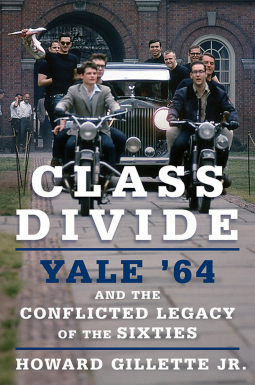
Class Divide
Yale '64 and the Conflicted Legacy of the Sixties
by Howard Gillette, Jr.
This title was previously available on NetGalley and is now archived.
Send NetGalley books directly to your Kindle or Kindle app
1
To read on a Kindle or Kindle app, please add kindle@netgalley.com as an approved email address to receive files in your Amazon account. Click here for step-by-step instructions.
2
Also find your Kindle email address within your Amazon account, and enter it here.
Pub Date May 21 2015 | Archive Date May 05 2015
Description
Members of the Yale College class of 1964—the first class to matriculate in the 1960s—were poised to take up the positions of leadership that typically followed an Ivy League education. Their mission gained special urgency from the inspiration of John F. Kennedy’s presidency and the civil rights movement as it moved north. Ultimately these men proved successful in traditional terms—in the professions, in politics, and in philanthropy—and yet something was different. Challenged by the issues that would define a new era, their lives took a number of unexpected turns. Instead of confirming the triumphal perspective they grew up with in the years after World War II, they embraced new and often conflicting ideas. In the process the group splintered.In Class Divide, Howard Gillette Jr. draws particularly on more than one hundred interviews with representative members of the Yale class of ’64 to examine how they were challenged by the issues that would define the 1960s: civil rights, the power of the state at home and abroad, sexual mores and personal liberty, religious faith, and social responsibility. Among those whose life courses Gillette follows from their formative years in college through the years after graduation are the politicians Joe Lieberman and John Ashcroft, the Harvard humanities professor Stephen Greenblatt, the environmental leader Gus Speth, and the civil rights activist Stephen Bingham.Although their Ivy League education gave them access to positions in the national elite, the members of Yale ’64 nonetheless were too divided to be part of a unified leadership class. Try as they might, they found it impossible to shape a new consensus to replace the one that was undone in their college years and early adulthood.
Advance Praise
"Class Divide is an elegantly crafted
account of the effect sixties-era cultural and political rebellion had
on a very select group of Americans: the Yale class of 1964. Howard
Gillette Jr.'s ability to put the lives of his classmates into sharply
drawn historical contexts is quite remarkable. Gillette's subjects went
on to do spectacular things and many became nationally known figures,
which makes this tale particularly significant as a work of both
historical scholarship and cultural criticism."—David Farber, Temple
University, author of Everybody Ought to Be Rich: The Life and Times of John J. Raskob, Capitalist
"Class Divide says a lot about America before and after the
watershed of the 1960s. Howard Gillette Jr. has transformed the personal
stories of Yale's class of '64 into a political and cultural narrative
about American society in transition. This insider's collective
biography illuminates in a compelling way a key juncture in U.S.
history."—Joseph Soares, Wake Forest University, author of The Power of Privilege: Yale and America’s Elite Colleges
Available Editions
| EDITION | Other Format |
| ISBN | 9780801453656 |
| PRICE | $29.95 (USD) |



